When the Royal Shakespeare Company seemed to be falling apart in the late 1990s, there was genuine cause for concern. The troupe had no automatic monopoly over performances of Shakespeare, nor could it claim a very particular style in its stagings. But since the 1960s it had held a special place at the higher end of British theatre culture as the natural, and national, promoter and evolver of the world’s greatest body of plays. By 2001, under artistic director Adrian Noble, the RSC was out of London, in retreat in Stratford-upon-Avon, and looking punctured. It was an unhappy sight.
Anyone hungry for Shakespeare who’d grown up in the two or three decades after the company’s foundation in 1961 would once have had performances guaranteed both in Stratford and London – in the capital, first at the Aldwych Theatre, then from 1982 at the Barbican Centre. Post-Thatcher and chasing increasingly pared-back public funding, the RSC tried to reinvent itself. But by the end of Noble’s reign (2003), its ensemble principle, central to founder Peter Hall’s original vision, had cracked and the company was running a debt of over £2 million.
There was a problem, too – or a perceived one – with what was considered the RSC’s beating heart: a by now little-loved red-brick theatre in Stratford. Erected in 1932 after a fire incinerated the late-19th-century building, it was feeling its age and was less enjoyable to be a spectator in than the much smaller, more authentically wooden, cheery Swan Theatre at the south end of the Avonside complex, opened in 1986.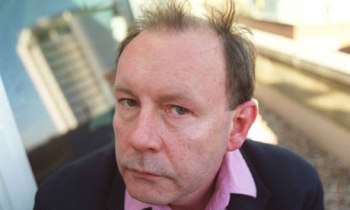 Michael Boyd (pictured right) took over the RSC directorship from Noble. Four years later, the main auditorium was dismantled. Boyd could have had the entire building demolished but it was listed – and the focus was to be, anyway, strictly on better performing conditions, attempting delivery of plays as they might once have been done in Shakespeare’s time.
Michael Boyd (pictured right) took over the RSC directorship from Noble. Four years later, the main auditorium was dismantled. Boyd could have had the entire building demolished but it was listed – and the focus was to be, anyway, strictly on better performing conditions, attempting delivery of plays as they might once have been done in Shakespeare’s time.
“There was no question,” Boyd tells theartsdesk, “that the new building should do anything other than allow our main-stage productions of Shakespeare to be as bold as they needed to be.”
Moreover, the building and completion of the Globe, and the discovery eight years earlier of the remains of the Rose Theatre, made archaeology-led thinking about authentic performance in the 1990s a sine qua non of all reconstructions of Shakespeare. In the new millennium, a new Royal Shakespeare Theatre (RST) had every incentive to match if not outshine its competitors.
Over four years and £112 million later, has the rebuild managed this? Yes and no, is the answer. The chief interior innovation (pictured below, the new RST auditorium) is an emphatic thrust stage, rising to just above waist height, fed by two diagonal entrances through the auditorium, called run-ons. The overall design is like the Swan’s, only bigger.
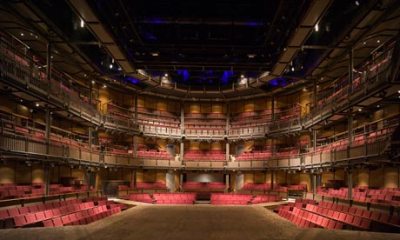 The brick edges of the old proscenium are still visible; a mix of red and grey steel and wood throughout is pleasing – it all feels unostentatiously, unfussily new. Odeon-like overspaciousness, which could also feel oppressive, has been replaced by pristine symmetry and proximity. Before, spectators in the upper balcony were 27 metres away from the action. Now, no one is more than 15 metres away. Its former capacity of 1,400 has been reduced by about 400 seats.
The brick edges of the old proscenium are still visible; a mix of red and grey steel and wood throughout is pleasing – it all feels unostentatiously, unfussily new. Odeon-like overspaciousness, which could also feel oppressive, has been replaced by pristine symmetry and proximity. Before, spectators in the upper balcony were 27 metres away from the action. Now, no one is more than 15 metres away. Its former capacity of 1,400 has been reduced by about 400 seats.
“The actors are jumping up and down with their tails wagging,” Boyd enthuses. “You’re out on the cliff face to the audience: there’s no hiding for an actor. It’s an epic space, or can be – fully able to represent angels and devils, heaven and hell. But it’s also a human space.”
Outside, the old brick façade has been retained but to the right of this, as you face it, the most dramatic new structures stand. The main entrance now takes you straight into the box-office area and a gift shop – the RSC has become quite unapologetic about branding – which lie at one end of a long, open couloir, joining the main theatre and the Swan. This certainly makes the whole complex feel more integrated, more accessible to anyone who, not necessarily going to a play, might just want to check out Stratford’s most prominent landmark.
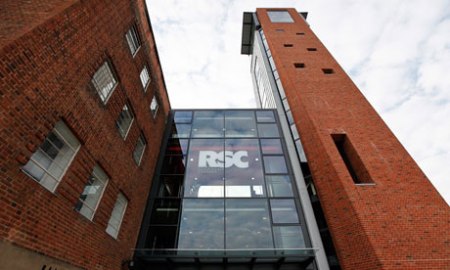 But ah, yes, the tower (pictured above). For £2.50, you can go up it, by lift or stairs. It’s 115ft high and resembles the kind of appendage you might see attached to a fire station, or, as one unimpressionable Stratford observer has put it, “part of an upmarket prison camp”. Michael Boyd is thrilled with it.
But ah, yes, the tower (pictured above). For £2.50, you can go up it, by lift or stairs. It’s 115ft high and resembles the kind of appendage you might see attached to a fire station, or, as one unimpressionable Stratford observer has put it, “part of an upmarket prison camp”. Michael Boyd is thrilled with it.
“The tower’s really something to do if you’re in the town,” he says. “From the top you can see four counties, the Vale of Evesham and all the famous Shakespeare landmarks. The idea for this was in the planning early on, to replace what went before, which was itself something of a fag-end of the old 19th-century tower.” Fair enough (though one RSC Associate Artist has also already been heard referring to it as “that fucking tower”).
As for the new stage, another well-known actress says just looking at it makes her feel tired. “You have to run onto it while everyone else is running off it to keep the scenes flowing. You can’t keep still, because you’ll be anxious you’re blocking somebody’s view.” So a debate between proscenium and thrust has not been put to bed. Professor Michael Dobson, one of the country’s leading Shakespeareans and shortly to take over as director of Stratford’s Shakespeare Institute, explains:
“From the 1960s to the 1990s, various RSC directors tried to tinker with the shape of the old auditorium but never got away from the fact that it was a whopping great proscenium-arch theatre. At different times, people would blame it for things they thought weren’t working. Now, being the contrary creatures they are, directors are lining up to complain about the new theatre: we can’t design for it, it makes all the productions seem the same, we don’t like the angles, we don’t like the seats etc. But it is an exciting space. It feels much more intimate than the old RST. The acoustics are wonderful: actors can whisper again, though I hope that won’t stop them from speaking properly, speaking up, as well.”
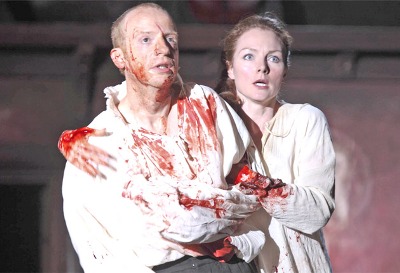 Boyd’s new production of Macbeth meanwhile (pictured right, Jonathan Slinger as Macbeth, Aislín McGuckin as Lady Macbeth) is certainly mobile – barring the long scene between Malcolm and Macduff, the play is built on jarring exits and entrances – fleet of foot across the thrust and wonderful to listen to, too, with three musicians playing on a raised platform at the back. This would have been hard to make work on the old stage. The witches, three hanged children (the first scene is, annoyingly, cut), descend on nooses right at the front of the stage: a striking effect which, again, the old space couldn’t have accommodated.
Boyd’s new production of Macbeth meanwhile (pictured right, Jonathan Slinger as Macbeth, Aislín McGuckin as Lady Macbeth) is certainly mobile – barring the long scene between Malcolm and Macduff, the play is built on jarring exits and entrances – fleet of foot across the thrust and wonderful to listen to, too, with three musicians playing on a raised platform at the back. This would have been hard to make work on the old stage. The witches, three hanged children (the first scene is, annoyingly, cut), descend on nooses right at the front of the stage: a striking effect which, again, the old space couldn’t have accommodated.
This busy, inventive, young-feeling Macbeth is a great way to baptise the new theatre, though it would have been even more compelling had Jonathan Slinger and Steven Toussaint (Banquo) swapped roles. Isn’t a dreadlocked Macbeth just what the 2011 RST has been waiting for?
But artistically, the RSC's cylinders are clearly firing. The rebuild might be stoking the energy. Rupert Goold’s Las Vegas-based The Merchant of Venice is vibrant, in-yer-face and hard to get into. The two shows I saw at the Swan, Massinger’s The City Madam (pictured below: Matti Houghton, Sara Crowe and Lucy Briggs-Owen) and Gregory Doran’s “Shakespeare-reimagined” Cardenio, bubble with wit, design brio and bright young acting (bouquets in particular to Briggs-Owen and Alex Hassell, outstanding in both). Playwright-in-residence Tarell Alvin McCraney and associate Anthony Neilson are also developing new work – long central to the company’s remit – while David Greig has had a hit with Dunsinane, a reworking of Macbeth.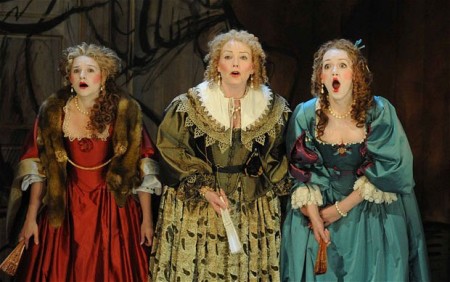 Dramaturg Jeanie O’Hare, who curates new writing, reminds theartsdesk that the RSC was always about more than Shakespeare and old plays: “The sentence I most often hear when asked what I do is, ‘I didn’t know the RSC did new work.’ There’s been a kind of cultural amnesia around its founding principles, one of which was to push new work alongside the classics. In the 1960s Harold Pinter was incredibly important to the RSC, which premiered The Homecoming. Shakespeare was a child of his time, socially perceptive, a writer with political consciousness. So, we need a writer like Tarell, with his interest in homophobia in hip-hop culture, really involved.”
Dramaturg Jeanie O’Hare, who curates new writing, reminds theartsdesk that the RSC was always about more than Shakespeare and old plays: “The sentence I most often hear when asked what I do is, ‘I didn’t know the RSC did new work.’ There’s been a kind of cultural amnesia around its founding principles, one of which was to push new work alongside the classics. In the 1960s Harold Pinter was incredibly important to the RSC, which premiered The Homecoming. Shakespeare was a child of his time, socially perceptive, a writer with political consciousness. So, we need a writer like Tarell, with his interest in homophobia in hip-hop culture, really involved.”
The future of the RSC’s studio space, The Other Place – serving as the foyer for the main-theatre replacement between 2007 and 2010, the nearby Courtyard (now dark) – isn’t clear; and while the company has a five-year deal for London productions with Cameron Mackintosh, not even Michael Boyd knows whether the RSC will have its own theatre in the capital again.
About the RSC and the capital, Michael Dobson is bullish: “There’s no sign yet of any permanent presence in London. It seems almost as if the RSC has surrendered to the Globe, which is an odd thing to do. Meanwhile, there’s all sorts of loose talk about what might happen to the Courtyard. Some people [meaning punters] have got quite attached to it while it’s been up. The dream situation would be if the RSC could acquire a bombsite, move the Courtyard there and have its own theatre in the middle of London, for heaven’s sake, and actually be a national company again.”
Watch a 10-minute film about the RSC's 2010-11 theatre transformation, fronted by Michael Wood

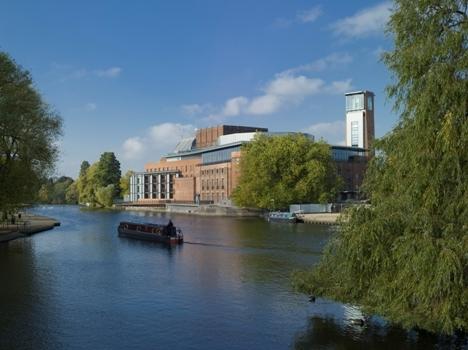













Add comment